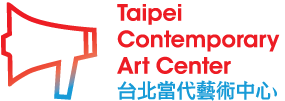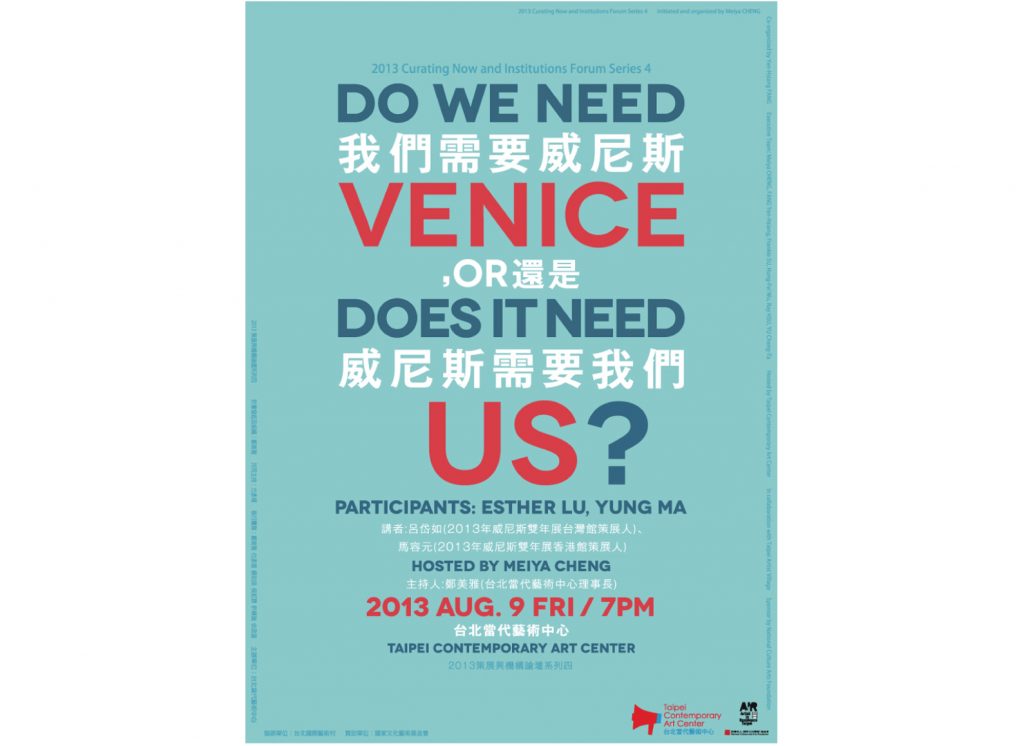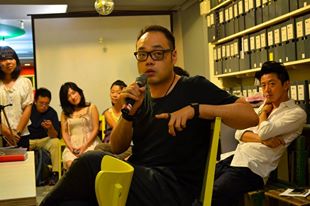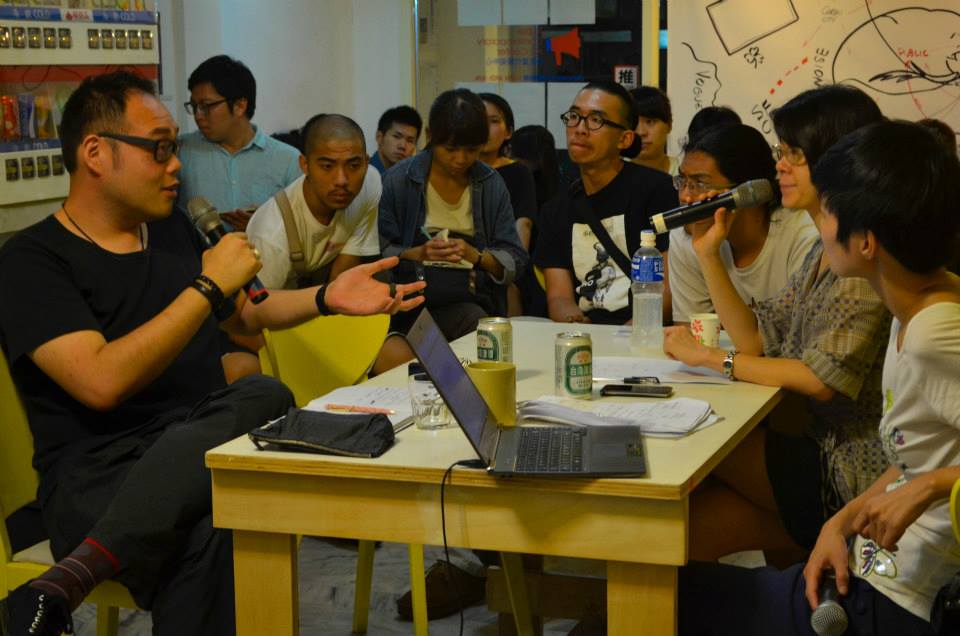2013策展與機構論壇系列四
2013 Curating Now and Institutions Forum Series 4
我們需要威尼斯,還是威尼斯需要我們?
Do we need Venice, or does it need us?
Aug.09 (Fri) 7pm
主持人/Moderator:鄭美雅(台北當代藝術中心理事長) Meiya Cheng, TCAC Chair
講者/speakers:
呂岱如(2013年威尼斯雙年展台灣館策展人) Esther Lu, curator of This is not a Taiwan Pavilion at the 2013 Venice Biennale
馬容元(2013年威尼斯雙年展香港館策展人) Yung Ma, co-curator of the Hong Kong Pavilion’s exhibition ‘You (you).’ by Lee Kit at the 2013 Venice Biennale
(Speech in Chinese only)
(For English please scroll down)
我們需要威尼斯,還是威尼斯需要我們?
2013威尼斯雙年展已然揭開序幕。風波過後,與下一次不可避免的爭議之前,恰恰是一個時機來解構、分析,並認識威尼斯雙年展,其成因,歷史,迷思,誤解,並分析其在不同的地區與國家藝術生產環境中所造成的爭議、影響、及歷史因素。以及,在今日的藝術經濟中,威尼斯雙年展的架構與其背後的意義。進一步,希望在一個較為清晰的架構下,開展本地藝術社群的對話,並藉此整理成為未來的批判思考。
本次論壇邀請台灣2013威尼斯台灣館策展人與香港館策展人,與本地藝術社群共同討論以下議題:
- 威尼斯雙年展的歷史背景?其背後的國家與資本權力架構?
- 何謂有效的國際操作?無論本地的遴選機制最終為何,無可避免,必須分析並面對所謂「國際現實」背後隱含的資本操作,國際網絡,國家象徵權力(及資本),及藝術機構(包括商業機制)在其中的運作。
- 討論「符合國際現實的操作」─那麼,實務操作何謂有效?從機構的有效性,策展人或藝術家制,國家代表隊制,一個台灣各抒己見,或是資本最大制?
- 以香港與台灣範例相互參照—由最有效之國際操作模式邏輯下所建置而成的藝術機構((M+)所主辦,輔以國際藝廊之支持所成形的香港館,相較於台灣……………………………,兩者皆無法避免國際與本土之爭議。那麼,其爭議於兩地背後的成因為何?差異處?為何兩地藝術社群皆無法建立對威尼斯館制度面(無論為何)的共識及信任?
- 以「雙年展」為唯一進入國際藝術社會途徑的迷思,是否暗示了本地藝術生產環境的匱乏?如若威尼斯的西方中心建置意味著發展國家資本與國家權力的邏輯,既無資本亦無國家象徵權力的台灣,如何突圍?而這是一個兩年一次的議題,或是十年、二十年的議題?
這個當下過時,但永恆回歸的議題所涉及的藝術生產,國際政治議題,遠遠超過兩年一次的雙年展究竟是誰獲選的問題。在這個策展與機構論壇的系列,我們將這個涉及國際政治,藝術機構、策展與藝術機制的問題納入,也同時,希望開啟本地藝術社群彼此間一個跳脫事件,真實相對的對話。
主持人及講者介紹
鄭美雅生於1975,居住並工作於台北。現為獨立策展人,台北當代藝術中心理事長。曾任台北當代藝術館策展人(2006-2008))。精選策展經歷:「擴增世界」第六屆台北數位藝術節國際邀請展(2011,剝皮寮歷史街區),「未來事件交易所」(2012,與姚嘉善共同策展,台北當代藝術中心),「遊牧影展錄影藝術特輯」(2010,台北當代藝術中心)。近期展覽計畫:「第六屆皇后雙年展」(2013,與岩崎仁美共同策展,皇后美術館,紐約。)
她關注藝術生產中勞動與價值的交換機制及權力關係,以及藝術機制本身的系統性問題。她試圖討論藝術機構可能的開放性架構,以及它作為一個運作機制,如何作用於藝術體系。據此,她共同參與了台北當代藝術中心的成立及運作,試圖發展出一個開放性架構,以群體合作的模式,凝聚一個藝術社群,並共同營運這個實驗性的獨立機構。
受邀參與講座包括2011曼徹斯特亞洲三年展-「未來機構」,德國萊比錫當代藝術館,亞太三年展(2012)等。近年發表文章散見於典藏今藝術、畫廊雜誌(中國)、藝術與投資(中國),主編讀本:「歐洲重要嗎?」(2013, 為芭芭拉.史黛娜擔任藝術總監的歐洲n次方計畫之一)。
呂岱如從事獨立策展與寫作,現居台北。
她長期關注於觀念性的策展實驗,在機制內外尋求連結與對話契機,在現實社會場景與藝術再現的平台間,梳理另類的生產關係,創造政治的能動性。
2006至2008年,她赴斯德哥爾摩參與CuratorLab策展實驗室的進修課程與駐村,在當地開始策劃藝術活動。2007年在伊斯坦堡,協同策劃《大家族企業》(Big Family Business),經營實驗性的藝術空間,以當地雙年展作為文本脈絡、藝術家與觀眾來源,進行為期一個月機動式的展演、座談與評論勞動。2008年獲選參與柏林雙年展年輕策展人工作坊。同年獲國家文化藝術基金會的補助,於台北市立美術館安南.亞珥仔(Adnan Yildiz)協同策劃《好流氓》(Good Gangsters in Town),將展覽生產直接作為策展研究與展示的對象,和藝術家一起進行了一場後設展覽、批判展演機制的實驗。同年隨赴紐約ISCP駐村。2013年於巴黎Cité international des arts 進行策展駐村。
2009至2011年間,她在北京與台北參與了不同的環境運動與組織,對社會、政治議題展開不同面向的拓展與實踐。2011年策劃展覽《不可小覷:十組藝術家對能源和災難的想像策略》,作為藝術實踐與社會運動碰撞的探索。2013年策劃第五十五屆威尼斯雙年展平行展《這不是一座台灣館》,在機制批判的脈絡上探索美學語彙的取徑。
紙上策展作品包括《點子發電機》、協同策劃《二頁》,皆於典藏今藝術發表。近日藝評文章散見香港藝術雜誌Pipeline。
馬容元1979年出生於上海,畢業於英國瑞丁大學藝術系和英國皇家藝術學院當代藝術策劃研究所,現為香港M+視覺文化館策展團隊其中一員。他是今年第五十五屆威尼斯雙年展香港館李傑個展的策展人。他曾擔任香港Para/Site藝術空間與第五十三屆威尼斯雙年展香港館白雙全個展的助理策展人。他於2011年被Para/Site藝術空間和廣州的維他命藝術空間邀請擔任「一個婚禮」的客席策展人。這個展覧計劃共展出了超過一百多位國際藝術家的作品。他也是英國Guest Projects空間「The Visionary Trading Project」(2011)的聯合策展人,並為海內外各類型的刊物與展覽圖錄撰寫文章。
2013策展與機構論壇系列四
計畫發起及組織:鄭美雅
共同主持:方彥翔
執行團隊:鄭美雅、方彥翔、蘇珀琪、陳小雜、吳虹霏、許峰瑞、余政達
主辦單位:台北當代藝術中心
協辦單位:台北國際藝術村
贊助單位:國家文化藝術基金會
Do we need Venice, or does it need us?
The 2013 Venice Biennale has opened. Before the next inevitable controversy arrives, now is a perfect time to deconstruct, analyze the origin, history, myth and misunderstanding of Venice Biennale, and also, to examine the controversies, influences and historical factors it creates in the art environments of different regions and countries. Further, we want to discuss the structure of and meaning behind Venice Biennale in today’s economics of the arts. Through forming a clearer structure, we wish to start a dialogue within local art community and provide a direction for future critical thinking.
We invited curators of the Taiwan Pavilion and Hong Kong Pavilion at this year’s Venice Biennale for this Friday Talk. The topics are as followings:
1. What’s the historical background of the Venice Biennale? What’s the national and capital structure of it?
2. What’s effective global operations? Regardless of how Taiwan selects its candidate, we need to understand the involvement and workings of capital, international networking, powers of nations and art institutions of ‘international reality’.
3. Discuss an operation that fit the international reality. What’s an effective strategy to be “visible”? An effective institute? Or curators/artists based? Or should we try and enter international venues as a national delegation or everyone fights on their own? Or let the ones with the most financial capital go?
4. Compare the experiences of Hong Kong and Taiwan. The Hong Kong Pavilion was organized by M+ (an art institution built by effective international operation mode) and supported by international galleries, while Taiwan was…… But both can not escape from the controversy of international v. s. local. We want to know the results and differences of their controversies. And why both art communities could not build a consensus and trust toward Venice Biennale?
5. Is it an indication that there is something lacking in the local art-making environment if there exist a myth that entering the Biennale is the only way to enter the world’s art society? If housing a pavilion at the Venice Biennale is for a country to develop its capital or influence in the West, how does Taiwan—where it doesn’t possess capital and is not recognized as a nation—make itself known in the world? And is this issue occurring every two years or every decade?
The issues of art production and international politics outweigh who is the winner at the Biennale. At this talk, we wish to have a genuine discussion with local art communities on international politics, art institutions, curating and art production mechanism.
About Moderator / Speakers:
Meiya Cheng (b. 1975,) is a freelance curator, and now the chair of Taipei Contemporary Art Center. She lives and works in Taipei. She has worked as the curator of Museum of Contemporary Art, Taipei (2006-2008.) Her selected curated exhibition include : Augmenting the World, (The 6th Taipei Digital Art Festival, international section, 2011)) Trading Futures, (co-curated with Pauline Yao, TCAC, 2012.) Urban Nomad Film Festival video art section (TCAC, 2010.) Exhibit in planning is 6th Queens International (co-curated with Hitomi Iwasaki, Queens Museum, NYC.)
Cheng focuses on the exchange mechanism of labor and value, and the structural issues in art production. She intends to discuss the possibilities of creating an open structure in institutions, and if such models could serve as a mechanism to create changes in the system. CHENG participated in the founding and operation of Taipei Contemporary Art Center since 2009. With teamwork as the working model, she tries to builds up an alternative model that constantly examines and self/examines institutional the conditions in art production.
She was invited to participate in forums, seminars include Asia Triennial Manchester (2011),Leipzig Museum of Contemporary Art (2011) and Asia Pacific Triennial (2012.) She has contributed in magazines Artco magazine (Taiwan.) Art and Investment (China) and Broadsheet(Australia). In 2013 she edited the reader “Does Europe Matters?” (a project as part of Goethe Institute’s transnational project Europe (to the power of) n, directed by Barbara Steiner.
Esther Lu, born in 1977, is a Taiwanese freelance curator based in Taipei. Lu studied literature and art history, and completed an MA at Goldsmiths College and curatorial studies in CuratorLab, Konstfack University. She is interested in exploring practices to mobilize connections and conversations inside and outside of institutions. Her conceptual experiments often address the agency of art and initiate alternative artistic productions in between social scenes in reality and platforms of art in order to investigate the critical role of art today.
Lu curated the project This is not a Taiwan Pavilion (2013), the collateral event in the 55th Venice Biennale. She co-curated Big Family Business (2007) in Istanbul and Good Gangsters in Town (2008) in Taipei Fine Arts Museum. She presented Turntable Series II: Idea Generator, and co-curated Duet as curatorial projects on printed matter in Artco Magazine. In 2011, she curated the exhibition Don’t Brush Off What You See: 10 Ideas from Artists on Energy and Disaster. She has been active in environmental and social movements in Taipei. Her recent articles are published in the Hong Kong-based art magazine Pipeline.
Yung MA
Born 1979 in Shanghai, Yung Ma is currently part of the curatorial team at M+, museum for visual culture, in Hong Kong. He is also the co-curator of the Hong Kong Pavilion’s exhibition ‘You (you).’ by Lee Kit at the 55th Venice Biennale. He was the assistant curator at Para/Site Art Space in Hong Kong. He was also the assistant curator and project manager of Pak Sheung Chuen’s solo exhibition Making (Perfect) Word: Harbour, Hong Kong, Alienated Cities and Dreams for the Hong Kong Pavilion at the 53rd Venice Biennale. In 2011, he was the guest curator of A Wedding, an exhibition and event featuring works from over 100 international artists co-organised by Para/Site Art Space and Vitamin Creative Space, and co-curator of The Visionary Trading Project at Guest Projects in London. Ma also contributes regularly to a number of publications and exhibition catalogues. He holds a M.A. in Curating Contemporary Art from the Royal College of Art and a B.A. in Fine Art and Japanese from the University of Reading.
2013 Curating Now and Institutions Forum Series 4
Initiated and organized by Meiya CHENG
Co-organized by Yen-Hsiang FANG
Executive Team: Meiya CHENG, Yen-Hsiang FANG, Frankie SU, Haisu-Tsa Eleanore Chen, Hung-Fei Wu, Ray HSU, YU Cheng-Ta
Hosted by Taipei Contemporary Art Center
In Collaboration with Taipei Artist Village
Sponsor:National Culture and Arts Foundation
活動紀錄
TEXT/賴佳翎
2012年底,台灣的藝文圈正為2013年第55屆的威尼斯雙年展評選爭議掀起一股夾雜憤怒與質疑聲音的狂浪,這是第一次打破了過往向來以台灣當代藝術家為參展者的慣例,代表台灣參展的三位藝術家其中有兩位是外籍人士,分別是台灣藝術家許家維、台德混血藝術家白伯恩(Bernd Behr),以及捷克藝術家凱特里娜.色達(Katerina Seda)。策展人呂岱如對此表示,近年她觀察到其他國家館也陸續提出新的做法,如2011年的波蘭館邀請以色列藝術家芭塔娜(Yael Bartana)個展;2009年德國館是英國藝術家基里克(Liam Gillick)代表參展,明年則是艾未未。
在「We need Venice or Venice need us」討論會,策展人鄭美雅首先拋出幾個核心問題──文化政策的有效性以及其所需面對的國際限制,也就是北美館如何回應國際限制的問題。 而這部分就牽涉到獨立策展機構存在之必要性,無論在評選的指標、選擇的機制或在概念上的操作,對於執行上應如何可能都有直接關聯。然而,可以觀察到台灣自解嚴以後仍處於官僚體制主宰的藝術環境的狀態,北美館或其它公部門缺乏直接觸及到當今藝術生態的需求,也無法使藝術環境達到最大的開放、最大利益的實踐,這些問題不僅是回應台灣館爭議的關鍵,也是目前很少被探討的內容。
另外,則是討論到台灣藝術家沒有都被選進去的問題,是否給予本土藝術家應「被照顧」的想像,由此可以反省「台灣館」究竟是在威尼斯雙年展扮演什麼角色?我們在其中投射什麼想像和期待?若策展人在台灣,藝術家在國際,那麼培養台灣藝術家與國際接軌的這個目的有達成嗎?又或者我們應該以什麼樣的內容在何種脈絡上被看見?於是,回到一開始對威尼斯雙年展的想像,歸因於台灣藝術場域本身就受到諸多限制,對內在現實的層面相當缺乏獨立機構的照顧,對外則如藝評人王柏偉所說,台北和國際都是「真空」的狀態下,任何一條途徑都被阻斷,雙年展便無奈地成為唯一的途徑。
談及我們需要威尼斯還是威尼斯需要我們,若以更廣大的視野來看,其實威尼斯更需要外來的金錢援助以支撐其經濟和政治環境,而台灣在近十年來不斷地被放進中國和全球化的意識框架討論,除了對於中國大陸的資本不信任以外,也可以關注到如何藉由跨國合作達到執行上的加乘效應。與其談威尼斯雙年展與台灣館的關係,我們或許更該重視在當今的藝術實踐上,我們所需要拘泥的是什麼?其間的可能性應持續地被討論或創造出來,而在策展人或整體的藝術環境上,是否能做出持續實踐性的制度改革,都是值得繼續做更深入的探討的議題。
photo 攝影 / 林怡君 Esther Lin




